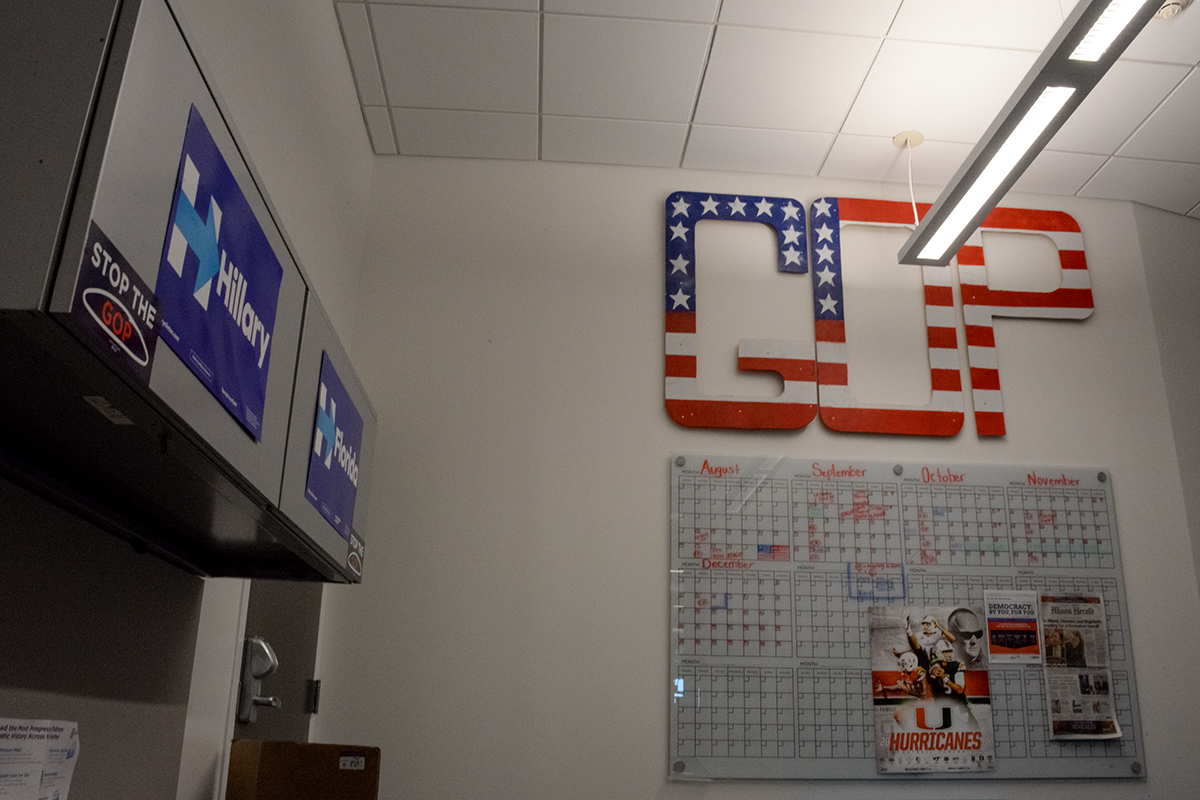It was the day after one of the most unprecedented wins in the history of the United States. Republican businessman Donald Trump handily defeated Democratic nominee and former Secretary of State Hillary Clinton to become the 45th president. Vocal Trump supporters on campus celebrated with chants and cheers louder than those usually filling the College Republicans weekly meetings.
As Trump solidified his lead in Florida, one of the most important swing states with 29 electoral votes, supporters began to realize just how close they were to a win.
Liztiffany Couceiro, a sophomore studying political science, watched the voting results come in with hope as the projections slowly lined up in Trump’s favor. And with Florida’s victory, she could not be happier.
“As a person that does not want Hillary to win, it makes me proud of my Floridians,” Couceiro said.
Carlos Rohl, who studies economics, noted that Trump garnered strong support that helped him pull off an improbable win.
“I feel that Trump got more people to go out and vote,” Rohl said. “His emotional appeal to rural supporters may have brought them out to vote.”
After the Rathskeller closed down at midnight, freshman Samantha Burkart said she was “excited, anxious and hopeful.”
“I honestly was expecting Hillary to win and blow him out of the water,” she said. “But I am so excited that we’re winning the state of Florida.”
However, on the other side of the spectrum, Clinton supporters felt shock.
Many students wore all black clothing in “mourning” on Wednesday, mere hours after their champion conceded the presidency to Trump.
Osamudia James, UM law professor and vice dean, had voted at nearby St. Augustine polling center on Tuesday with her young daughter. She was excited for her daughter to watch the first woman become president. But the result was not what she expected.
“I wanted her to remember the day forever, but not for the reasons that ended up characterizing the day,” James said Wednesday. “I’m heartbroken over the loss.”
James, who often writes about race and higher education, said the election proved how there is still a conversation about race that needs to happen in this country.
“We can’t move forward as a society until we acknowledge, embrace and tackle that problem,” she said.
When she told her daughter this morning that Clinton lost, James said her daughter could tell her mother was distressed and she, too, sounded worried about the uncertain future of the United States.
“She asked, ‘What are we going to do if he decides black people have to leave the country?’” James said. “Children in America shouldn’t be asking these questions.”
For many voters, the reaction to a Trump presidency split along the very lines the university is trying to strengthen: race, gender and ethnicity.
“You only see the minorities on campus worried about this. Everyone else is just moving on, going about their day,” said Bryce Pickett, a freshman majoring in political science. Pickett, who wore a black T-shirt with the iconic “black power” fist on it, said he remembers discrimination he’s felt at UM and since he was a boy, when a white kindergartener told him to, “wash his skin” because it was “dirty.”
When he was considering rushing a fraternity, he approached some members at a tabling event on campus. That was when the “brothers” told him, “Yeah, we usually don’t have black people rush,” Pickett said.
Milind Khurana, an Indian-American student who is part of United Black Students with Pickett, said his parents became worried for his safety as soon as the election results were announced.
“My dad texted me asking me to shave my beard today,” Khurana said, running his hand over a cheek covered in dark hair.
Sophomore Billah Abdul-Jalaal, who voted absentee for Clinton in his hometown of Washington, D.C., said he has heard degrading comments about Muslim Americans, even from friends who didn’t know he practiced Islam.
“There are a lot of people like me who don’t look Muslim,” Abdul-Jalaal said.
Yet the most offensive thing, many students said, was how much support Trump garnered.
“It’s not only the fact that he’s there but that half of Americans voted for him,” Khurana said.
Freshman Jori Opara watched part of the election night coverage in the UBS office and another part at the Rat watch party. Even just hearing about small scuffles that took place between Trump supporters and other students, Opara said, made her question how the nation could unite for the next four years.
“I don’t know how, as a people, we’re going to move forward and support Trump,” she said.
After the results were announced around 2:30 a.m. Wednesday, students posted paragraphs on social media condemning the landslide support of Trump and expressing fear about the next four years.
“I’m still in shock. He’s not my president,” Opara said.
Correction, April 30, 2018: This article previously stated Milind Khurana was a Muslim student. He is not Muslim.
Amanda Herrera, Jorge Chabo and Marcus Lim contributed to reporting.






